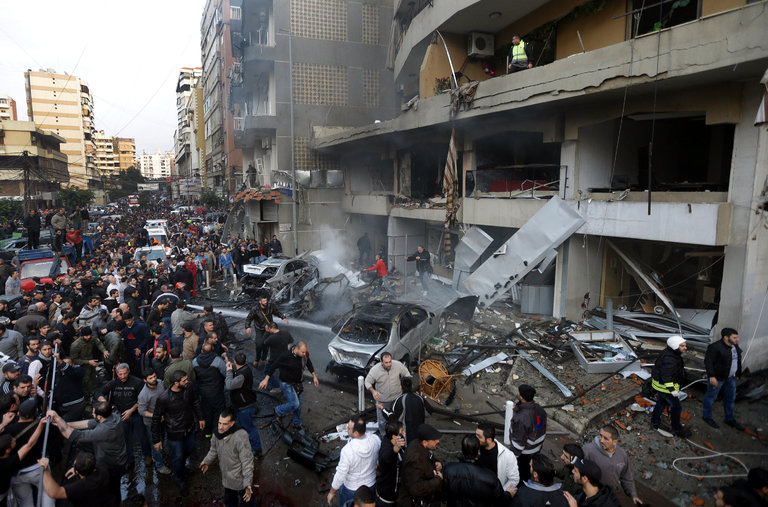On Tuesday, the Israeli military launched one of its heaviest daytime attacks on Hezbollah-controlled areas in Beirut’s southern suburbs, signaling a significant intensification in the ongoing conflict. Israel’s Defense Minister, Israel Katz, ruled out any ceasefire until key Israeli objectives are met, including Hezbollah’s disarmament and withdrawal beyond the Litani River.
Plumes of smoke rose over Beirut as a series of at least 10 airstrikes hit the city, targeting 12 sites identified as Hezbollah facilities. The advance warning from the Israeli army urged residents to avoid these areas. Video footage circulating on social media captured the moment two missiles struck a high-rise building, reducing it to rubble and sending clouds of debris billowing over the area. Most residents had already fled following repeated Israeli airstrikes over recent months.
Meanwhile, northern Israel faced a series of attacks from Lebanon. Drones reportedly targeted a kindergarten in a Haifa suburb, where swift evacuation measures saved lives. The strikes left visible damage to the facility but caused no injuries among the children.
The Israel-Hezbollah conflict has intensified since September, following a year of mounting hostilities in the wake of the Gaza war. Israel has hit wide areas of Lebanon, including border villages and southern suburbs, in a campaign to weaken Hezbollah’s influence. These strikes have inflicted significant damage, killing numerous Hezbollah leaders and leveling vast areas controlled by the group.
During a recent meeting with Israel’s general staff, Defense Minister Katz emphasized that no ceasefire would occur until Israel’s objectives are met. “Israel will not agree to any arrangement that does not guarantee Israel’s right to enforce and prevent terrorism on its own,” Katz said. Foreign Minister Gideon Saar acknowledged progress in ceasefire discussions but stressed that the war is not yet over, citing the challenges of ensuring a lasting agreement.
While Hezbollah has suffered significant losses, the group maintains its readiness for a prolonged conflict, with rocket fire from Lebanon prompting evacuations of northern Israeli towns and villages. Imran Riza, U.N. Humanitarian Coordinator for Lebanon, highlighted the severe human toll, noting a recent airstrike in Mount Lebanon that killed 23 people, including seven children. In Tyre, an airstrike killed five siblings with special needs, underscoring the high civilian cost of the conflict.
Lebanese health authorities report that over the past year, Israeli operations have led to 3,243 deaths and 14,134 injuries within Lebanon, with many casualties occurring in areas with civilian populations. In response, Hezbollah’s cross-border attacks have resulted in approximately 100 Israeli and Lebanese civilian and military deaths, with casualties extending into the Israeli-occupied Golan Heights and southern Lebanon.
Calls for a ceasefire, backed by the Lebanese government and invoking a U.N. Resolution from 2006, continue amid the mounting humanitarian crisis. Over a million Lebanese have been displaced, and northern Israel has seen tens of thousands evacuated in response to rocket fire. As Israel’s campaign continues, the region faces escalating humanitarian and security concerns, with no clear resolution in sight.



